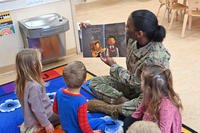From time to time, from the back seat of my car, I hear the faint sounds of a choice word spoken in a high-pitched voice.
My 3-year-old daughter cusses like a sailor -- or, more accurately, like a soldier.
Or even more accurately, like a soldier who was raised in a Navy town.
Or, most accurately of all, like a soldier who was raised in a Navy town and then married a journalist.
Because, as much as I'd love to point the finger at my husband or his job, I'm the Must-Have Parent in our family and the bad language blame is at least partly mine.
Even before she was potty trained, our little girl had a potty mouth. Worse, she cusses well. She uses the right word at the right time. It can be very jarring.
She doesn't do it all the time and, fortunately, she hasn't done it at pre-school or around other parents ... yet. But I fear that day is coming.
The thing is, I don't actually disapprove of cussing. I've heard people say that it's a sign of a poor vocabulary, but I disagree. I have an outstanding vocabulary but, as a writer, it is my professional opinion that sometimes bad words are the best words for the job.
"Frankly, my dear, I don't give a ... "
What? A toot? A crumb? Or even totally rephrased to "Frankly, my dear, I don't care" -- the message wouldn't have been as powerful.
Moreover, scientists have studied cussing (how fun their jobs must be!) and discovered that the act of saying a swear word actually engages the brain in ways that saying a regular word doesn't. Warning: There's lots of bad language in this link.
But kids and cussing are not copacetic, so my husband and I make every effort to control our tongues when our children are present. We train our offspring to mind their mouths. We've explained to them that cussing -- like drinking, voting and ordering expensive entrees in restaurants -- is something only grown-ups get to do.
A Navy wife friend of mine uses a fantastic variant of this with her children. She tells them, "You can cuss like a sailor when you grow up and enlist."
We don't let our kids just wander around spewing expletives because we'd be setting them up for failure if we did. We know their friends' parents aren't likely to approve. Their teachers are not likely to let a curse word slide. Their future employers probably won't find it professional or amusing.
Our two oldest children understand all of this. They internalized this lesson from an early age, and we've never had a problem with them letting a stray %@#& or *!#% slip.
But our little one ... Sigh. She's got a lot to learn.
I started thinking about all of this this week after seeing this in The Washington Post. (It's a fairly G-rated and amusing post, so it's probably safe for even the most expletive-averse to click on.)
According to the article, and to the research behind it, all cuss words are not used equally in all parts of the country. Certain regions greatly favor some words over others.
(Note: the whole point of the blog linked here is to discuss the prevalence of bad words in certain parts of the country. If reading bad words bothers you, DO NOT CLICK THE LINK!)
According to their research, growing up where I did in middle Tennessee, one of many places known as the "Buckle of the Bible Belt," I was likely to hear the words "crap" and "gosh" a lot -- and I did.
And where my husband grew up in Virginia Beach, he was likely to hear pretty much every other four-letter word frequently. Judging from his vocabulary, I think we can assume that he did.
But our kids are growing up in a military family, in military towns, and military people come from all over. That means that our kids are exposed to every region's bad words -- it's the United States of Swearing.
I'm sure my 3-year-old will have something to say about that.
Keep Up with the Ins and Outs of Military Life
For the latest military news and tips on military family benefits and more, subscribe to Military.com and have the information you need delivered directly to your inbox.





















